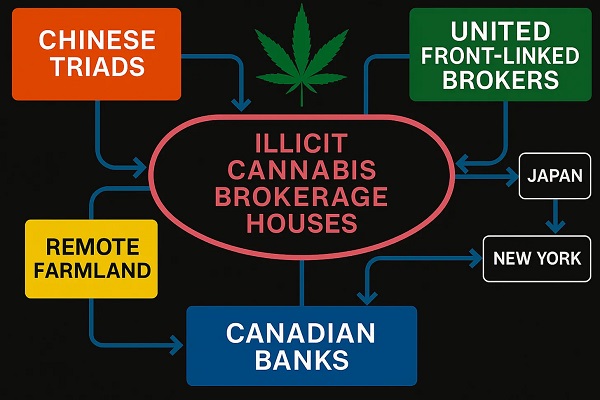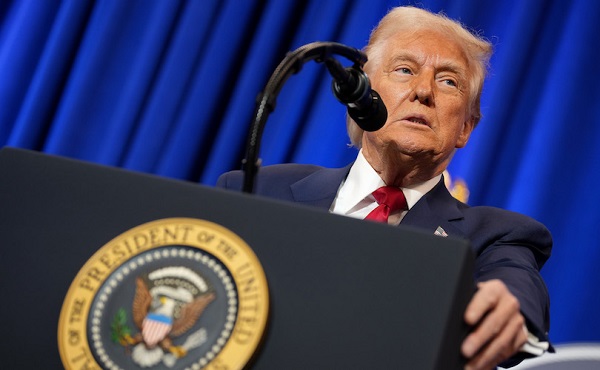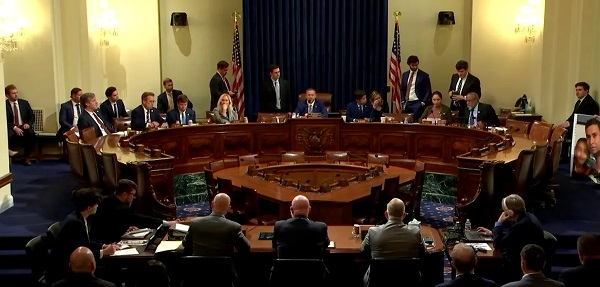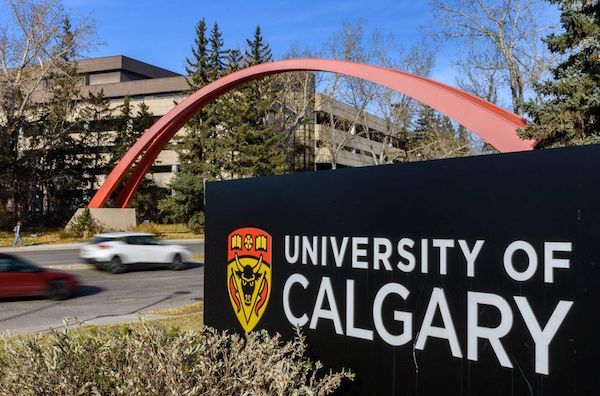International
Trump vows to reclaim Afghanistan air base after Biden’s botched exit

Quick Hit:
President Donald Trump says the U.S. is moving to retake Afghanistan’s Bagram Airfield, blasting Joe Biden for giving it away and stressing its value against China.
Key Details:
- Trump said the U.S. is actively working to retake Bagram, calling it “one of the biggest airbases in the world” and vital to countering China.
- He blamed Biden’s unconditional withdrawal for emboldening America’s adversaries, saying, “Putin would have never done what he did, except that he didn’t respect the leadership of the United States.”
- The Taliban currently controls the airfield but may seek U.S. concessions — aid, economic deals, or recognition — to return it, highlighting the cost of Biden’s surrender.
🚨 @POTUS on Bagram Airfield, which fell to the Taliban in Biden's botched Afghanistan withdrawal:
"We're trying to get it back, by the way. That could be a little breaking news… It's an hour away from where China makes its nuclear weapons." pic.twitter.com/Lbe9dcnfjS
— Rapid Response 47 (@RapidResponse47) September 18, 2025
Diving Deeper:
Bagram Airfield, constructed by the Soviets and later the backbone of America’s war effort in Afghanistan, was lost in 2021 after Biden ordered a chaotic and unconditional retreat. In a matter of days, the Taliban seized the base, erasing two decades of U.S. investment and leaving behind billions of dollars of equipment. Trump has consistently blasted Biden’s withdrawal as one of the most humiliating foreign policy disasters in modern history, contrasting it with his own plan to leave “with strength and dignity” while maintaining Bagram as a critical outpost.
Trump’s announcement alongside U.K. Prime Minister Keir Starmer underscored his administration’s determination to restore American power projection in Central Asia. The 47th president pointed out that Bagram is less than an hour from Chinese nuclear weapons facilities, making it a linchpin for keeping Beijing in check. “We want that base back,” Trump said firmly. “One of the reasons we want the base is, as you know, it’s an hour away from where China makes its nuclear weapons.”
By walking away from Bagram, Biden not only surrendered strategic leverage against China but also signaled weakness that reverberated worldwide. Trump made clear that Putin saw the Afghanistan debacle as proof of Biden’s incompetence, encouraging Moscow’s aggression in Ukraine. This view has been echoed by many foreign policy analysts who argue Biden’s foreign policy failures emboldened America’s adversaries from Russia to Iran.
The Taliban, predictably, insists it retains full control of Bagram and has rejected Trump’s warnings of Chinese involvement. But Trump’s announcement makes clear that under his leadership, the U.S. won’t sit by and allow a terrorist regime to hold such a strategically vital installation. Instead, he is pursuing a strategy to put America back in control — not just to reverse Biden’s blunders but to reassert U.S. strength against China and other adversaries.
Crime
From Vancouver to Oklahoma: Canadian Murder Case and CCP ‘Police Station’ Links Align U.S. Testimony and The Bureau’s PRC Pot Investigations

At a hearing Thursday in Washington, Oklahoma Bureau of Narcotics Director Donnie Anderson told lawmakers the death highlights the violence spreading through an industry hijacked by transnational Chinese gangs believed to be guided by the Chinese Communist Party. Anderson testified that Chinese networks have set up thousands of illegal grow operations in Oklahoma, exploiting the state’s loose licensing regime and funneling proceeds through global laundering systems, while pointing to a vast national security risk. Shielded Chinese government interests are believed to be behind marijuana grows strategically purchased beside sensitive infrastructure, including a munitions base in Oklahoma that produces much of the Pentagon’s heavy weapons.
“This isn’t just about marijuana,” Anderson said. “It is my belief that the CCP maintains access to the criminal marijuana site operations, particularly through its known practice of controlling expatriates via so-called ‘police stations.’”
Anderson tied the farms to human trafficking, fentanyl, money laundering, and the risk of broad access to U.S. critical infrastructure, noting that commanding directors from New York and California — seldom seen locally — were behind the exploitation of Oklahoma farmland.
Anderson’s testimony aligns precisely with The Bureau’s investigations into Chinese cannabis and money laundering networks in Vancouver, which found that Beijing’s United Front Work Department was orchestrating a parallel cannabis trafficking and laundering system. That system leveraged Canada’s legalization to export product abroad and recycle proceeds through Canadian banks. The key figures identified in Vancouver included associates of the notorious Sam Gor global fentanyl and methamphetamine trafficking triad networks, as well as targets of the RCMP’s investigations into CCP “police stations” in Canada.
The Bureau’s reporting found that United Front command-and-control cells in Vancouver were routing Canadian “B.C. Bud” across the country in trucks and into New York, where U.S. law enforcement has identified significant Chinese organized crime leadership.
The human toll of brutal Chinese crime operations on U.S. soil was another focus of the hearing, pointing to a Canadian link. Without naming the victim, Anderson referred to the drug house execution of a Canadian national in July near Lake Thunderbird, Oklahoma.
Local reports say the Pottawatomie County Sheriff’s Office confirmed the victim as 42-year-old Canadian citizen Vongphachanh Philavanh. Deputies responded around 10:30 p.m. on July 18 to a licensed marijuana grow on East Hill Drive, just east of Lake Thunderbird. Capt. J.T. Palmer said two masked men forced their way through the front door of a residence on the property. Shots were fired, Philavanh was killed, and two surviving workers were bound with duct tape as the intruders ransacked the home before escaping.
Investigators believe Philavanh was the target of a robbery.
The method bore the classic hallmarks of a “grow rip” — a home-invasion style raid long practiced by the Big Circle Boys, a cellular and ultra-violent network with roots in China’s military, in which masked assailants bind occupants, execute rivals or debtors, and strip properties of cash and product.
U.S. lawmakers heard yesterday that Philavanh’s death was not an isolated tragedy but evidence of a much larger command structure. All three witnesses in Thursday’s hearing — Anderson, Heritage Foundation fellow Paul Larkin, and former DEA executive Chris Urben — pointed to the same conclusion: the Chinese Communist Party stands behind the crime syndicates now dominating America’s marijuana industry.
Urben described a DEA investigation codenamed Operation Sleeping Giant, which found that beginning around 2016, Chinese criminal networks completely took over global money laundering for cartels and organized crime active in the United States. The key enabler, he told lawmakers, is WeChat, the encrypted platform controlled by Beijing. “No other global crime network has a (state-protected) trusted communications system like that,” Urben said. “WeChat needs to be disrupted. It cannot continue to function as a secure platform for criminal money laundering. There must be a state-level, legislated solution with the Chinese government — one that ends WeChat’s use in these trusted networks.”
This testimony aligns directly with The Bureau’s long investigation into Chinese state-linked laundering in Vancouver. Around the same period U.S. agents were running Operation Sleeping Giant, Canadian police in Richmond uncovered the Silver International case — a vast Chinese drug-cash bank that exposed the so-called Vancouver Model. According to a Canadian police expert with direct knowledge, United Front operatives and Sam Gor-affiliated figures turned short-term rental properties across Vancouver into covert cannabis brokerage houses. These homes aggregated marijuana from acreages in B.C.’s interior and readied shipments for destinations including New York and Tokyo. Investigators observed a steady stream of people arriving with garbage bags and leaving with duffels, a pattern that mirrored the cash couriering at the center of the Silver International casino case.
“It was just phenomenal,” a Canadian intelligence source told The Bureau. “And all of it links back, ultimately, to the exact family and community of people that we’ve talked about for years.”
The source pointed to senior Vancouver Chinese consulate associates and known leaders of Beijing’s United Front Work Department community groups in Canada. These networks have been linked to Chinese military and government veterans operating in Canada. In The Bureau’s reporting, police sources said marijuana legalization under Prime Minister Justin Trudeau inadvertently handed Chinese organized crime the perfect cover. Product from farms in Oliver, Prince George, and the Okanagan was consolidated in the Lower Mainland, packaged and branded in transient brokerage houses, and then shipped east across Canada in gutted appliances and commercial loads. Once across the border, it flowed into New York, where cash proceeds were collected in United Front-linked brokerages and cycled back into Canadian financial institutions.
“They transport it down, and then we started seeing the rise of these brokerage houses again, with United Front control and Asian organized crime links,” a source said. “New York is a favourite destination. The weed goes out in a variety of routes, the money comes back to be laundered. The process is repeated.”
The system was sophisticated, distributed, and shielded by state direction. “Since legalization, Asian organized crime has emerged as the dominant force behind cannabis in Canada,” one source texted to The Bureau. “Product from grow ops in the interior of B.C. gets consolidated at short-term rental houses in the Lower Mainland. Brokers bid on product and provide packaging services for online sales.”
The fact that United Front suspects identified in these Canadian investigations — including community figures tied to Beijing’s Vancouver consulate — were the same actors later scrutinized by RCMP in foreign police station probes aligns exactly with Anderson’s testimony that he believes the People’s Republic of China has direct access to U.S. marijuana operations through CCP diaspora-control networks. The Bureau’s reporting found corroborating evidence of those commanding networks in Vancouver, and the same patterns of control exist in Ontario as well.
International
Trump sues New York Times for $15 billion over ‘malicious, defamatory’ election coverage

From LifeSiteNews
Trump slammed the New York Times’ negative, election-year coverage of his family’s business as the ‘single largest illegal Campaign contribution, EVER.’
President Donald Trump announced on Monday he has filed a $15 billion libel suit against the New York Times for its critical coverage of his family’s business ventures, calling it the “single largest illegal Campaign contribution, EVER.”
“Today, I have the Great Honor of bringing a $15 Billion Dollar Defamation and Libel Lawsuit against The New York Times, one of the worst and most degenerate newspapers in the History of our Country, becoming a virtual ‘mouthpiece’ for the Radical Left Democrat Party,” Trump wrote on Truth Social.
“I view it as the single largest illegal Campaign contribution, EVER. Their Endorsement of Kamala Harris was actually put dead center on the front page of The New York Times, something heretofore UNHEARD OF! The ‘Times’ has engaged in a decades long method of lying about your Favorite President (ME!), my family, business, the America First Movement, MAGA, and our Nation as a whole,” he continued.
The suit names the Times, Penguin Random House, and NYT reporters Peter Baker, Russ Buettner, Susanne Craig, and Michael Schmidt, regarding Buettner and Craig’s 2024 book Lucky Loser: How Donald Trump Squandered His Father’s Fortune and Created the Illusion of Success (published by Penguin) and a trio of critical articles the paper published about Trump prior to the election.
These works, the suit maintains, were “a malicious, defamatory, and disparaging book written by two of its reporters and three false, malicious, defamatory, and disparaging articles, all carefully crafted by Defendants, with actual malice, calculated to inflict maximum damage upon President Trump, and all published during the height of a Presidential Election that became the most consequential in American history”; in order to “(a) damage President Trump’s hard-earned and world-renowned reputation for business success, (b) in the process, sabotage his 2024 candidacy for President of the United States, and (c) prejudice judges and juries in the unlawful cases brought against President Trump, his family, and his businesses by his political opponents for purposes of election interference.”
The president seeks $15 billion in “compensatory damages,” plus punitive damages and legal costs.
“This lawsuit has no merit. It lacks any legitimate legal claims and instead is an attempt to stifle and discourage independent reporting,” the Times responded. “The New York Times will not be deterred by intimidation tactics. We will continue to pursue the facts without fear or favor and stand up for journalists’ First Amendment right to ask questions on behalf of the American people.”
“Penguin Random House stands by the book and its authors and will continue to uphold the values of the First Amendment that are fundamental to our role as a book publisher,” added a Penguin spokesperson, who also called the suit “meritless.”
Trump has sued numerous media outlets on defamation grounds, with some success. He secured a $16 million settlement with CBS parent company Paramount in July and a $15 million settlement from ABC News in December 2024. He is also suing the Wall Street Journal and the Des Moines Register (plus the latter’s parent company Gannett), in fights that have yet to be resolved.
-

 International1 day ago
International1 day agoTrump sues New York Times for $15 billion over ‘malicious, defamatory’ election coverage
-

 Crime2 days ago
Crime2 days agoStruggle for control of the Sinaloa Carel has ramifications for Canada
-

 Crime2 days ago
Crime2 days agoU.S. Lawmakers Confront Chinese Government Conspiracy Behind Marijuana Boom
-

 Censorship Industrial Complex1 day ago
Censorship Industrial Complex1 day agoThe FCC Should Let Jimmy Kimmel Be
-

 Alberta1 day ago
Alberta1 day agoEducation negotiations update: Minister Horner
-

 Crime16 hours ago
Crime16 hours agoFrom Vancouver to Oklahoma: Canadian Murder Case and CCP ‘Police Station’ Links Align U.S. Testimony and The Bureau’s PRC Pot Investigations
-

 Business1 day ago
Business1 day agoThe Real Reason Tuition Keeps Going Up at Canada’s Universities
-

 Addictions1 day ago
Addictions1 day agoNo, Addicts Shouldn’t Make Drug Policy





